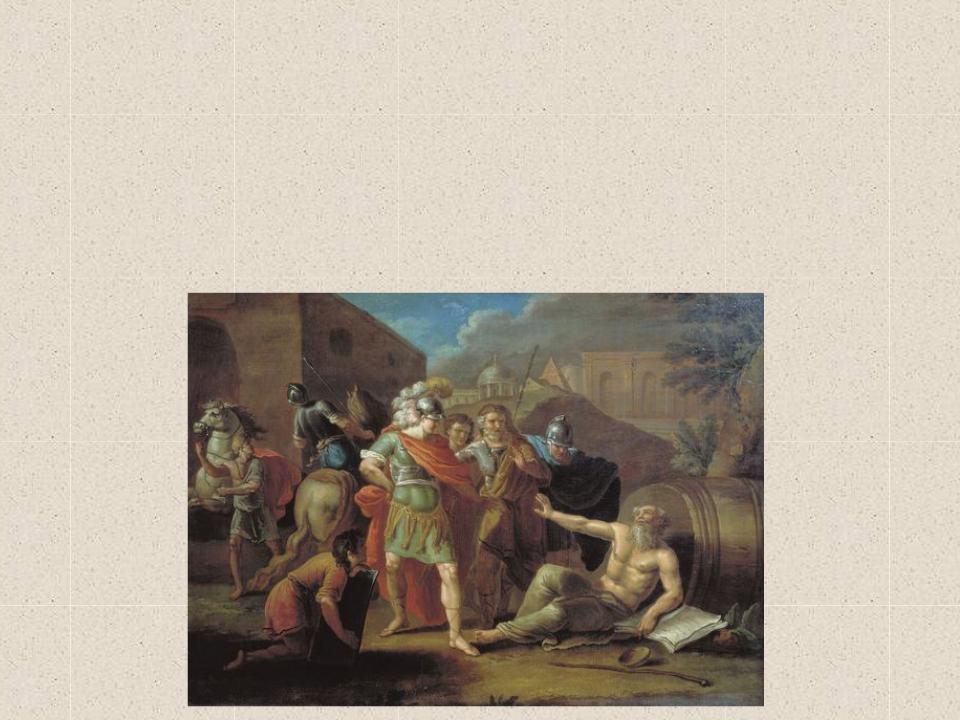
- •Ancient Greek- Roman philosophy
- •Ancient Greek and then Roman Mythology and Philosophy covers the period of 11-12
- •It originated in ancient Greek city states of democratic orientation. Its methods of
- •Of course, the early Greek philosophy is closely linked with the mythology, with
- •For myth as non-reflexive forms of consciousness the image of the world and
- •Being associated with a variety of elements that are in continuous change, and
- •Investigation for first principles of fixity (тұрақтылық) in the changing cycle of events
- •Development of ancient philosophy can be divided into three main periods:
- •2. Classical (Hellenistic) covers the period from 5th till 2th BC.
- •Criterion of such division is the basic problems, which were put in the
- •The basic problem of before
- •The first school, which tried to answer this question, was
- •His follower Anaximenes of Miletus considered, that firstprimary (негізгі) cause is air, because
- •His other follower
- •Next school was
- •The following doctrine was the doctrine of Heraclitus, who put in the basis
- •All things come into being by conflict of opposites, and the sum of
- •Heraclitus’ philosophy developed in ideological struggle with the Eley School doctrine. The most
- •They considered that there is no such phenomenon, as fundamental movement.
- •Zeno's paradoxes
- •Achilles and the ‘tortoise
- •The arrow paradox the flying arrow is motionless.
- •Problem of movement solved Atomists, who shared the world on two substations: emptiness
- •The second period is marked by change of the question. Henceforth (отныне) philosophers
- •He considered that cognition of man is the only condition of cognition of
- •Socrates developed his philosophy in the struggle with the Sophists
- •Attention of the Sophists had been carried from Cosmos and nature to the
- •Socrates’ follower was Plato, who considered, that everything, including the man, consists of
- •Plato also has developed the doctrine about ideas and the ideal state. Plato
- •Like Democritus, Plato spoke of the multiplicity of being. However, “being” to Plato
- •The follower of Plato Aristotle denied the Plato’s doctrine, proved, that there is
- •Aristotle’s teachings about being based on his doctrine of the categories set out
- •Categories of Aristotle is not notions, but the main features of life. These
- •In the third period the philosophers put a question on human moral existence.
- •Cynics considered that each man should adhere to the ascetic life. (Diogenes of
- •Main concept of his philosophy was autarky. Autarky is the quality of being
- •As opposed to them, hedonists considered that if a man has desires and
- •Stoics developed the doctrine of stoic sage (данышпан), who is not afraid of
- •Representatives of the Stoics school:

Plato also has developed the doctrine about ideas and the ideal state. Plato describes being as eternal and immutable (тұрақты), knowable only by reason and inaccessible to sensory perception.

Like Democritus, Plato spoke of the multiplicity of being. However, “being” to Plato is the world of supersensible, unchanging and eternal ideas. Each thing has the idea, and the ideas exists in the heaven, called Eidos Urania. Plato developed the myth of the cave.

The follower of Plato Aristotle denied the Plato’s doctrine, proved, that there is no world of ideas in the heaven. All consists of a matter
even man.

Aristotle’s teachings about being based on his doctrine of the categories set out in the special not a big book “Categories” and in his famous “Metaphysics”.

Categories of Aristotle is not notions, but the main features of life. These categories:

In the third period the philosophers put a question on human moral existence. The most known schools of this period are cynics, stoics, hedonists.

Cynics considered that each man should adhere to the ascetic life. (Diogenes of Sinope).

Main concept of his philosophy was autarky. Autarky is the quality of being self-sufficient.

As opposed to them, hedonists considered that if a man has desires and needs, it is necessary to satisfy them. (Epicure)

Stoics developed the doctrine of stoic sage (данышпан), who is not afraid of anything, controls own desires, regards to death as to the natural phenomenon.
